Business Environment Analysis: Vodafone's Strategies and Impacts
VerifiedAdded on 2020/01/15
|12
|3614
|78
Report
AI Summary
This report provides a comprehensive analysis of Vodafone's business environment, exploring various internal and external factors affecting its operations. It begins by identifying different types of business organizations, with a specific focus on Vodafone as a public limited company, and then delves into the identification of Vodafone's key stakeholders, including customers, shareholders, and the government, and the strategies employed by the company to meet their objectives. The report then examines different economic systems, assessing how they allocate resources effectively and evaluates the impact of fiscal and monetary policies on Vodafone's activities. Furthermore, it explores the impact of competition policies and market structures on Vodafone's pricing, output decisions, and organizational responses. The report also discusses the significance of international trade to Vodafone and examines the influence of global and cultural factors on its work culture. Finally, it provides conclusions based on the analysis, drawing on the impact of EU policies and other relevant regulatory mechanisms. This analysis highlights Vodafone's approach to maintaining its market position, addressing stakeholder needs, and adapting to the dynamic business environment.
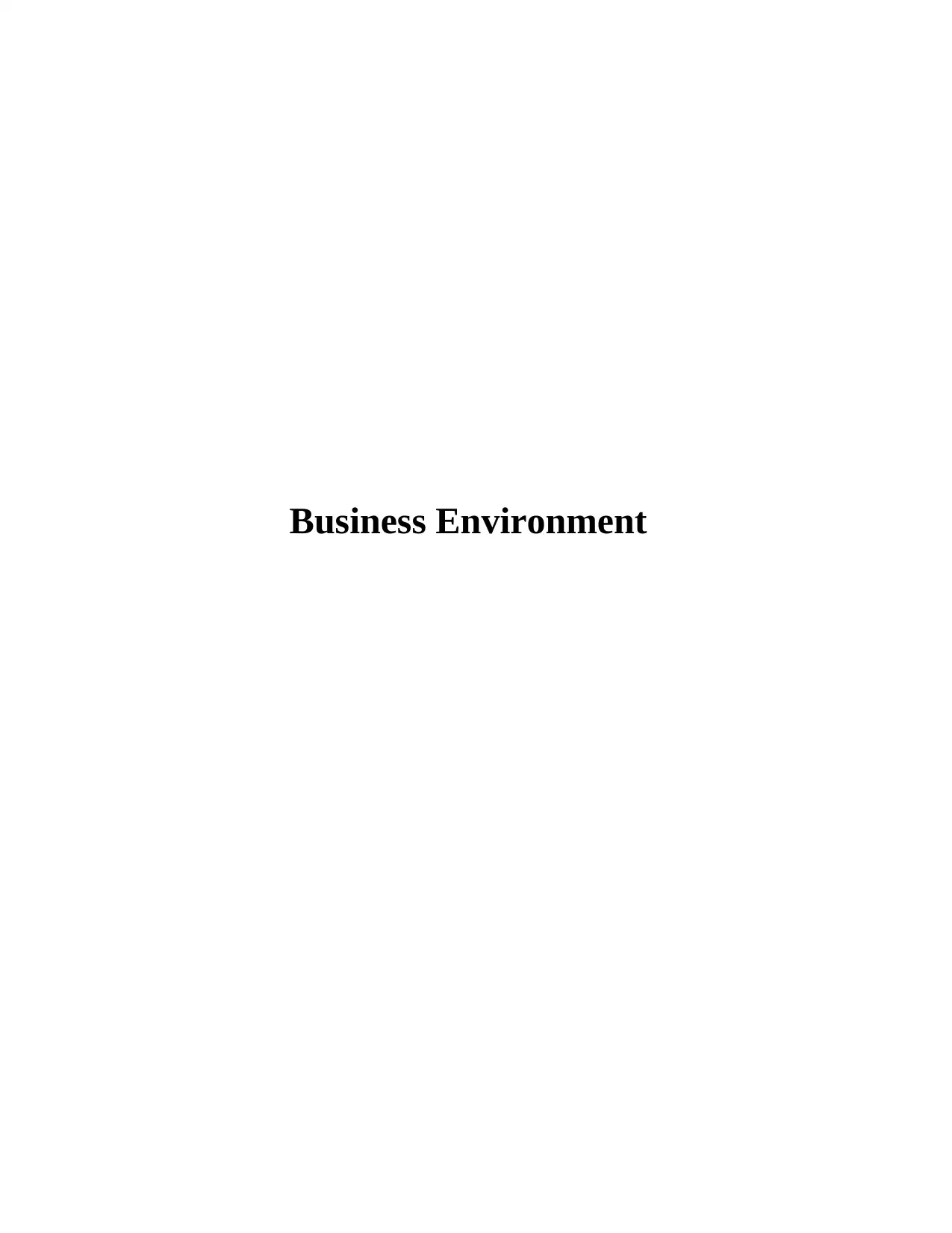
Business Environment
Paraphrase This Document
Need a fresh take? Get an instant paraphrase of this document with our AI Paraphraser
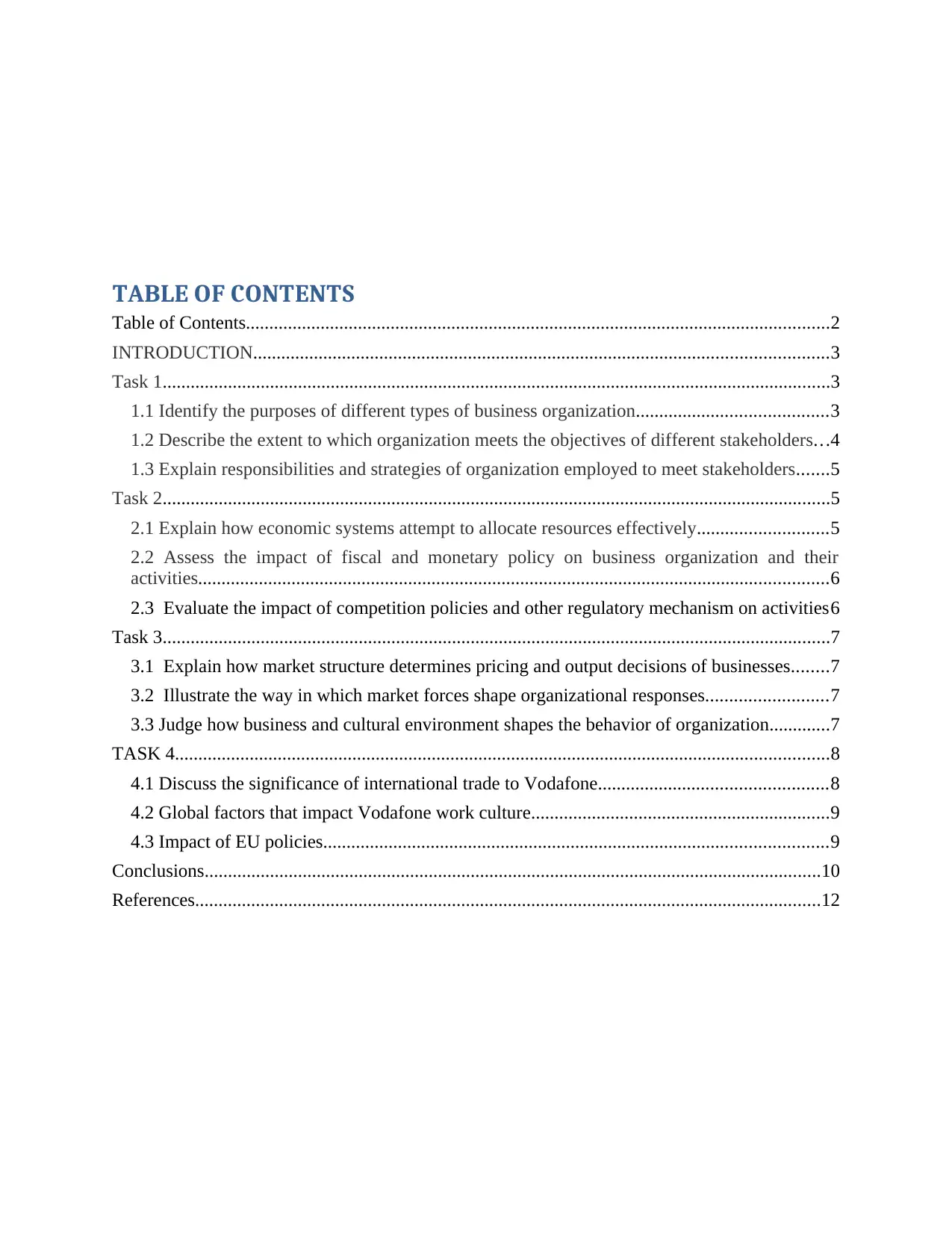
TABLE OF CONTENTS
Table of Contents.............................................................................................................................2
INTRODUCTION...........................................................................................................................3
Task 1...............................................................................................................................................3
1.1 Identify the purposes of different types of business organization.........................................3
1.2 Describe the extent to which organization meets the objectives of different stakeholders...4
1.3 Explain responsibilities and strategies of organization employed to meet stakeholders.......5
Task 2...............................................................................................................................................5
2.1 Explain how economic systems attempt to allocate resources effectively............................5
2.2 Assess the impact of fiscal and monetary policy on business organization and their
activities.......................................................................................................................................6
2.3 Evaluate the impact of competition policies and other regulatory mechanism on activities6
Task 3...............................................................................................................................................7
3.1 Explain how market structure determines pricing and output decisions of businesses........7
3.2 Illustrate the way in which market forces shape organizational responses..........................7
3.3 Judge how business and cultural environment shapes the behavior of organization.............7
TASK 4............................................................................................................................................8
4.1 Discuss the significance of international trade to Vodafone.................................................8
4.2 Global factors that impact Vodafone work culture................................................................9
4.3 Impact of EU policies............................................................................................................9
Conclusions....................................................................................................................................10
References......................................................................................................................................12
Table of Contents.............................................................................................................................2
INTRODUCTION...........................................................................................................................3
Task 1...............................................................................................................................................3
1.1 Identify the purposes of different types of business organization.........................................3
1.2 Describe the extent to which organization meets the objectives of different stakeholders...4
1.3 Explain responsibilities and strategies of organization employed to meet stakeholders.......5
Task 2...............................................................................................................................................5
2.1 Explain how economic systems attempt to allocate resources effectively............................5
2.2 Assess the impact of fiscal and monetary policy on business organization and their
activities.......................................................................................................................................6
2.3 Evaluate the impact of competition policies and other regulatory mechanism on activities6
Task 3...............................................................................................................................................7
3.1 Explain how market structure determines pricing and output decisions of businesses........7
3.2 Illustrate the way in which market forces shape organizational responses..........................7
3.3 Judge how business and cultural environment shapes the behavior of organization.............7
TASK 4............................................................................................................................................8
4.1 Discuss the significance of international trade to Vodafone.................................................8
4.2 Global factors that impact Vodafone work culture................................................................9
4.3 Impact of EU policies............................................................................................................9
Conclusions....................................................................................................................................10
References......................................................................................................................................12
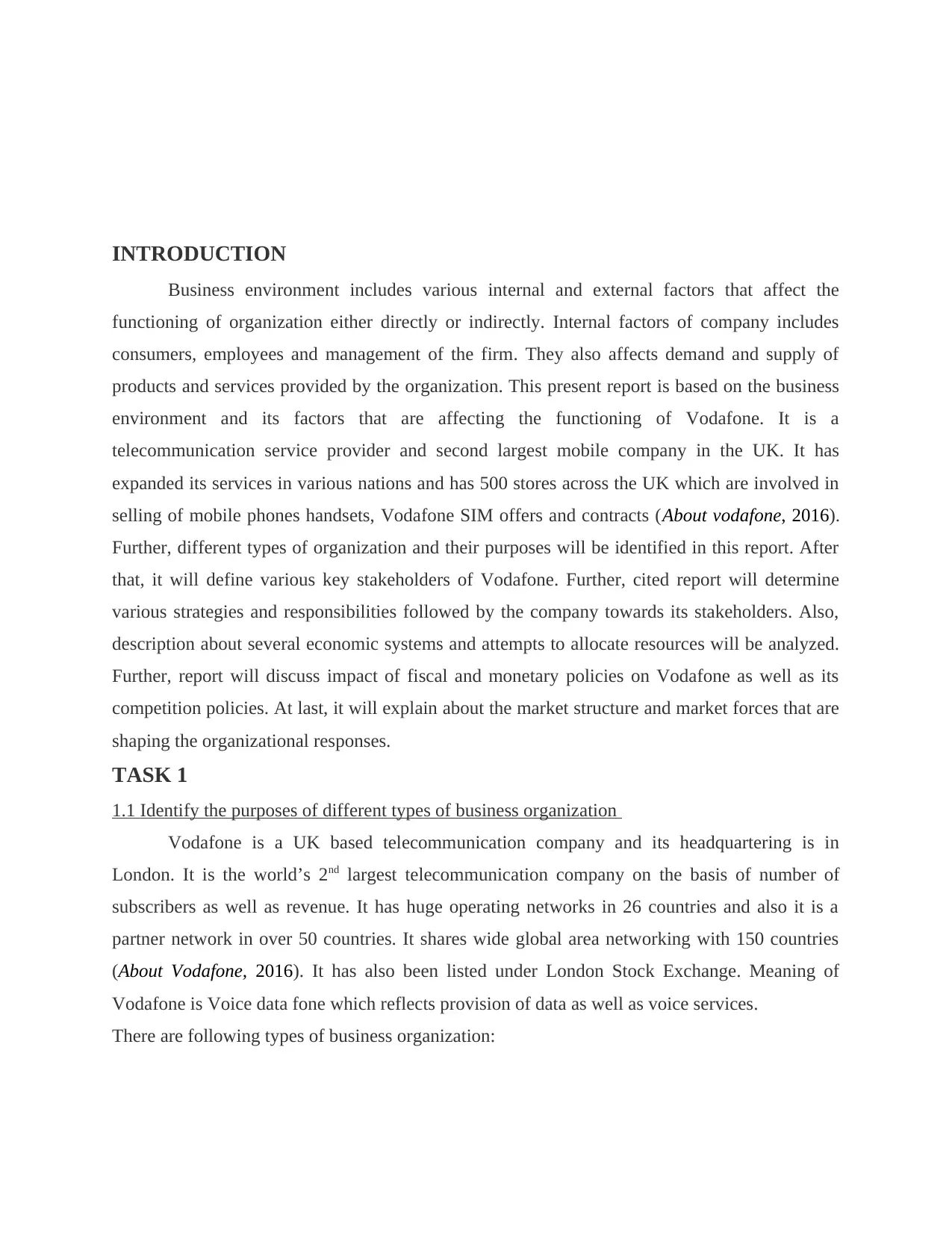
INTRODUCTION
Business environment includes various internal and external factors that affect the
functioning of organization either directly or indirectly. Internal factors of company includes
consumers, employees and management of the firm. They also affects demand and supply of
products and services provided by the organization. This present report is based on the business
environment and its factors that are affecting the functioning of Vodafone. It is a
telecommunication service provider and second largest mobile company in the UK. It has
expanded its services in various nations and has 500 stores across the UK which are involved in
selling of mobile phones handsets, Vodafone SIM offers and contracts (About vodafone, 2016).
Further, different types of organization and their purposes will be identified in this report. After
that, it will define various key stakeholders of Vodafone. Further, cited report will determine
various strategies and responsibilities followed by the company towards its stakeholders. Also,
description about several economic systems and attempts to allocate resources will be analyzed.
Further, report will discuss impact of fiscal and monetary policies on Vodafone as well as its
competition policies. At last, it will explain about the market structure and market forces that are
shaping the organizational responses.
TASK 1
1.1 Identify the purposes of different types of business organization
Vodafone is a UK based telecommunication company and its headquartering is in
London. It is the world’s 2nd largest telecommunication company on the basis of number of
subscribers as well as revenue. It has huge operating networks in 26 countries and also it is a
partner network in over 50 countries. It shares wide global area networking with 150 countries
(About Vodafone, 2016). It has also been listed under London Stock Exchange. Meaning of
Vodafone is Voice data fone which reflects provision of data as well as voice services.
There are following types of business organization:
Business environment includes various internal and external factors that affect the
functioning of organization either directly or indirectly. Internal factors of company includes
consumers, employees and management of the firm. They also affects demand and supply of
products and services provided by the organization. This present report is based on the business
environment and its factors that are affecting the functioning of Vodafone. It is a
telecommunication service provider and second largest mobile company in the UK. It has
expanded its services in various nations and has 500 stores across the UK which are involved in
selling of mobile phones handsets, Vodafone SIM offers and contracts (About vodafone, 2016).
Further, different types of organization and their purposes will be identified in this report. After
that, it will define various key stakeholders of Vodafone. Further, cited report will determine
various strategies and responsibilities followed by the company towards its stakeholders. Also,
description about several economic systems and attempts to allocate resources will be analyzed.
Further, report will discuss impact of fiscal and monetary policies on Vodafone as well as its
competition policies. At last, it will explain about the market structure and market forces that are
shaping the organizational responses.
TASK 1
1.1 Identify the purposes of different types of business organization
Vodafone is a UK based telecommunication company and its headquartering is in
London. It is the world’s 2nd largest telecommunication company on the basis of number of
subscribers as well as revenue. It has huge operating networks in 26 countries and also it is a
partner network in over 50 countries. It shares wide global area networking with 150 countries
(About Vodafone, 2016). It has also been listed under London Stock Exchange. Meaning of
Vodafone is Voice data fone which reflects provision of data as well as voice services.
There are following types of business organization:
⊘ This is a preview!⊘
Do you want full access?
Subscribe today to unlock all pages.

Trusted by 1+ million students worldwide
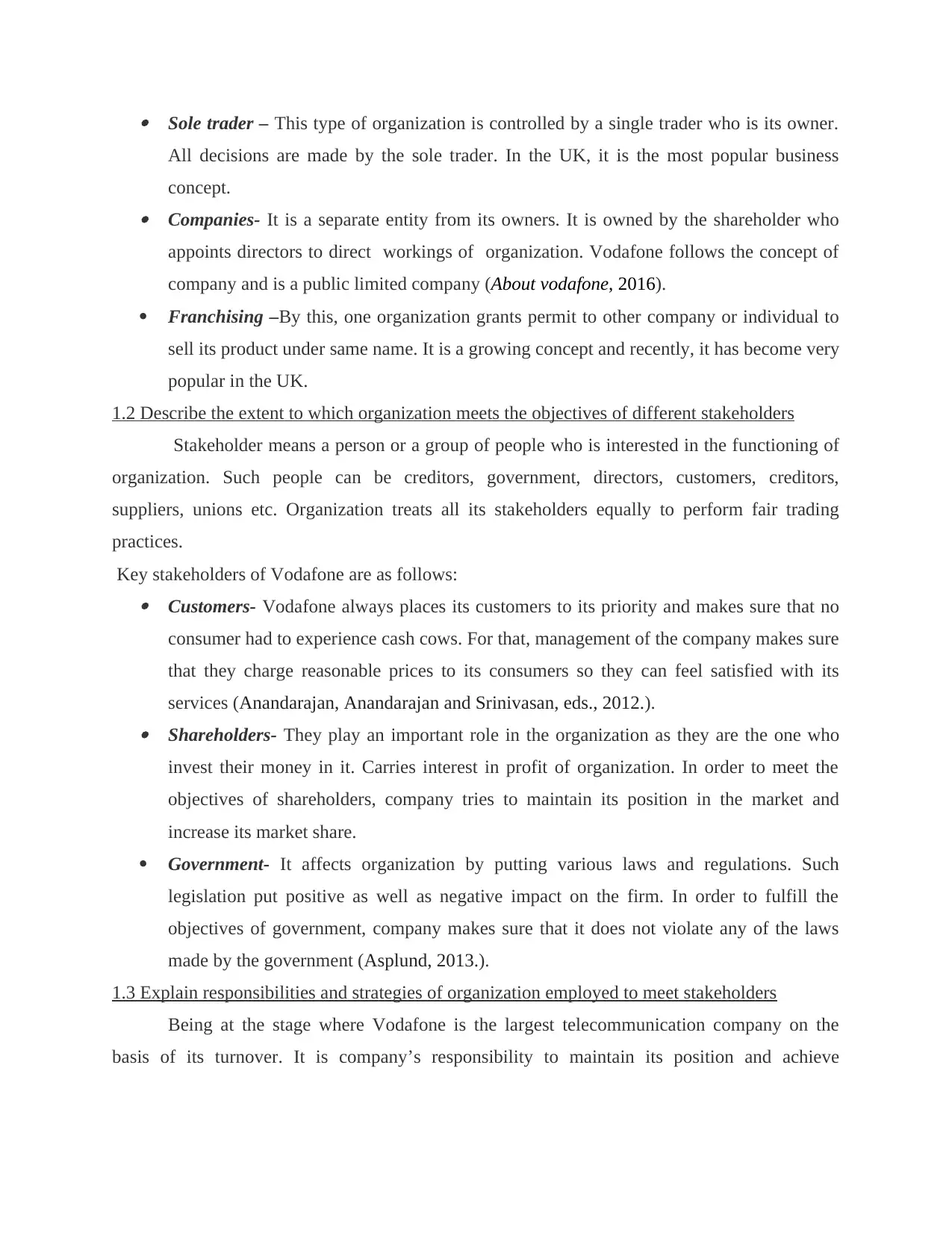
Sole trader – This type of organization is controlled by a single trader who is its owner.
All decisions are made by the sole trader. In the UK, it is the most popular business
concept. Companies- It is a separate entity from its owners. It is owned by the shareholder who
appoints directors to direct workings of organization. Vodafone follows the concept of
company and is a public limited company (About vodafone, 2016).
Franchising –By this, one organization grants permit to other company or individual to
sell its product under same name. It is a growing concept and recently, it has become very
popular in the UK.
1.2 Describe the extent to which organization meets the objectives of different stakeholders
Stakeholder means a person or a group of people who is interested in the functioning of
organization. Such people can be creditors, government, directors, customers, creditors,
suppliers, unions etc. Organization treats all its stakeholders equally to perform fair trading
practices.
Key stakeholders of Vodafone are as follows: Customers- Vodafone always places its customers to its priority and makes sure that no
consumer had to experience cash cows. For that, management of the company makes sure
that they charge reasonable prices to its consumers so they can feel satisfied with its
services (Anandarajan, Anandarajan and Srinivasan, eds., 2012.). Shareholders- They play an important role in the organization as they are the one who
invest their money in it. Carries interest in profit of organization. In order to meet the
objectives of shareholders, company tries to maintain its position in the market and
increase its market share.
Government- It affects organization by putting various laws and regulations. Such
legislation put positive as well as negative impact on the firm. In order to fulfill the
objectives of government, company makes sure that it does not violate any of the laws
made by the government (Asplund, 2013.).
1.3 Explain responsibilities and strategies of organization employed to meet stakeholders
Being at the stage where Vodafone is the largest telecommunication company on the
basis of its turnover. It is company’s responsibility to maintain its position and achieve
All decisions are made by the sole trader. In the UK, it is the most popular business
concept. Companies- It is a separate entity from its owners. It is owned by the shareholder who
appoints directors to direct workings of organization. Vodafone follows the concept of
company and is a public limited company (About vodafone, 2016).
Franchising –By this, one organization grants permit to other company or individual to
sell its product under same name. It is a growing concept and recently, it has become very
popular in the UK.
1.2 Describe the extent to which organization meets the objectives of different stakeholders
Stakeholder means a person or a group of people who is interested in the functioning of
organization. Such people can be creditors, government, directors, customers, creditors,
suppliers, unions etc. Organization treats all its stakeholders equally to perform fair trading
practices.
Key stakeholders of Vodafone are as follows: Customers- Vodafone always places its customers to its priority and makes sure that no
consumer had to experience cash cows. For that, management of the company makes sure
that they charge reasonable prices to its consumers so they can feel satisfied with its
services (Anandarajan, Anandarajan and Srinivasan, eds., 2012.). Shareholders- They play an important role in the organization as they are the one who
invest their money in it. Carries interest in profit of organization. In order to meet the
objectives of shareholders, company tries to maintain its position in the market and
increase its market share.
Government- It affects organization by putting various laws and regulations. Such
legislation put positive as well as negative impact on the firm. In order to fulfill the
objectives of government, company makes sure that it does not violate any of the laws
made by the government (Asplund, 2013.).
1.3 Explain responsibilities and strategies of organization employed to meet stakeholders
Being at the stage where Vodafone is the largest telecommunication company on the
basis of its turnover. It is company’s responsibility to maintain its position and achieve
Paraphrase This Document
Need a fresh take? Get an instant paraphrase of this document with our AI Paraphraser
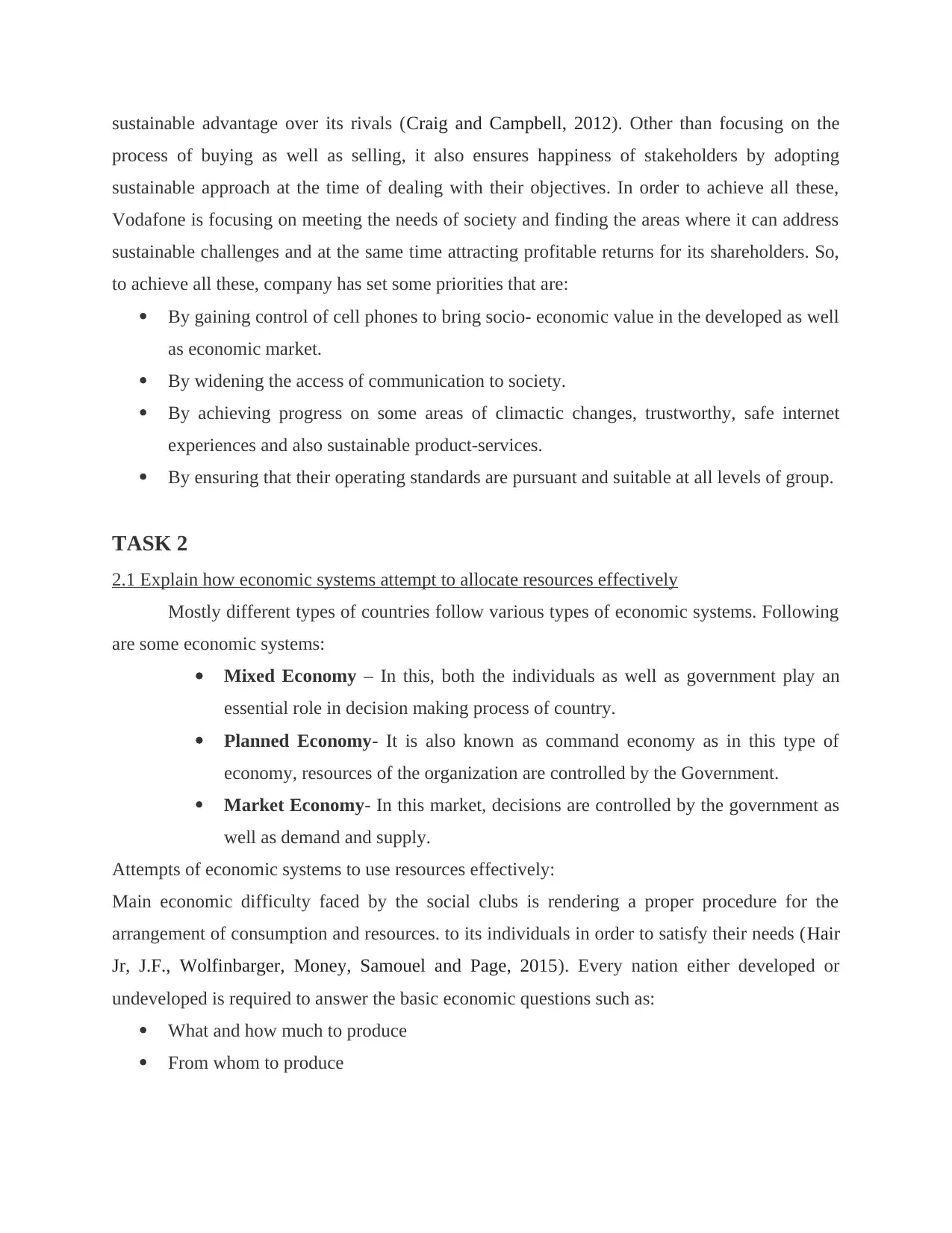
sustainable advantage over its rivals (Craig and Campbell, 2012). Other than focusing on the
process of buying as well as selling, it also ensures happiness of stakeholders by adopting
sustainable approach at the time of dealing with their objectives. In order to achieve all these,
Vodafone is focusing on meeting the needs of society and finding the areas where it can address
sustainable challenges and at the same time attracting profitable returns for its shareholders. So,
to achieve all these, company has set some priorities that are:
By gaining control of cell phones to bring socio- economic value in the developed as well
as economic market.
By widening the access of communication to society.
By achieving progress on some areas of climactic changes, trustworthy, safe internet
experiences and also sustainable product-services.
By ensuring that their operating standards are pursuant and suitable at all levels of group.
TASK 2
2.1 Explain how economic systems attempt to allocate resources effectively
Mostly different types of countries follow various types of economic systems. Following
are some economic systems:
Mixed Economy – In this, both the individuals as well as government play an
essential role in decision making process of country.
Planned Economy- It is also known as command economy as in this type of
economy, resources of the organization are controlled by the Government.
Market Economy- In this market, decisions are controlled by the government as
well as demand and supply.
Attempts of economic systems to use resources effectively:
Main economic difficulty faced by the social clubs is rendering a proper procedure for the
arrangement of consumption and resources. to its individuals in order to satisfy their needs (Hair
Jr, J.F., Wolfinbarger, Money, Samouel and Page, 2015). Every nation either developed or
undeveloped is required to answer the basic economic questions such as:
What and how much to produce
From whom to produce
process of buying as well as selling, it also ensures happiness of stakeholders by adopting
sustainable approach at the time of dealing with their objectives. In order to achieve all these,
Vodafone is focusing on meeting the needs of society and finding the areas where it can address
sustainable challenges and at the same time attracting profitable returns for its shareholders. So,
to achieve all these, company has set some priorities that are:
By gaining control of cell phones to bring socio- economic value in the developed as well
as economic market.
By widening the access of communication to society.
By achieving progress on some areas of climactic changes, trustworthy, safe internet
experiences and also sustainable product-services.
By ensuring that their operating standards are pursuant and suitable at all levels of group.
TASK 2
2.1 Explain how economic systems attempt to allocate resources effectively
Mostly different types of countries follow various types of economic systems. Following
are some economic systems:
Mixed Economy – In this, both the individuals as well as government play an
essential role in decision making process of country.
Planned Economy- It is also known as command economy as in this type of
economy, resources of the organization are controlled by the Government.
Market Economy- In this market, decisions are controlled by the government as
well as demand and supply.
Attempts of economic systems to use resources effectively:
Main economic difficulty faced by the social clubs is rendering a proper procedure for the
arrangement of consumption and resources. to its individuals in order to satisfy their needs (Hair
Jr, J.F., Wolfinbarger, Money, Samouel and Page, 2015). Every nation either developed or
undeveloped is required to answer the basic economic questions such as:
What and how much to produce
From whom to produce
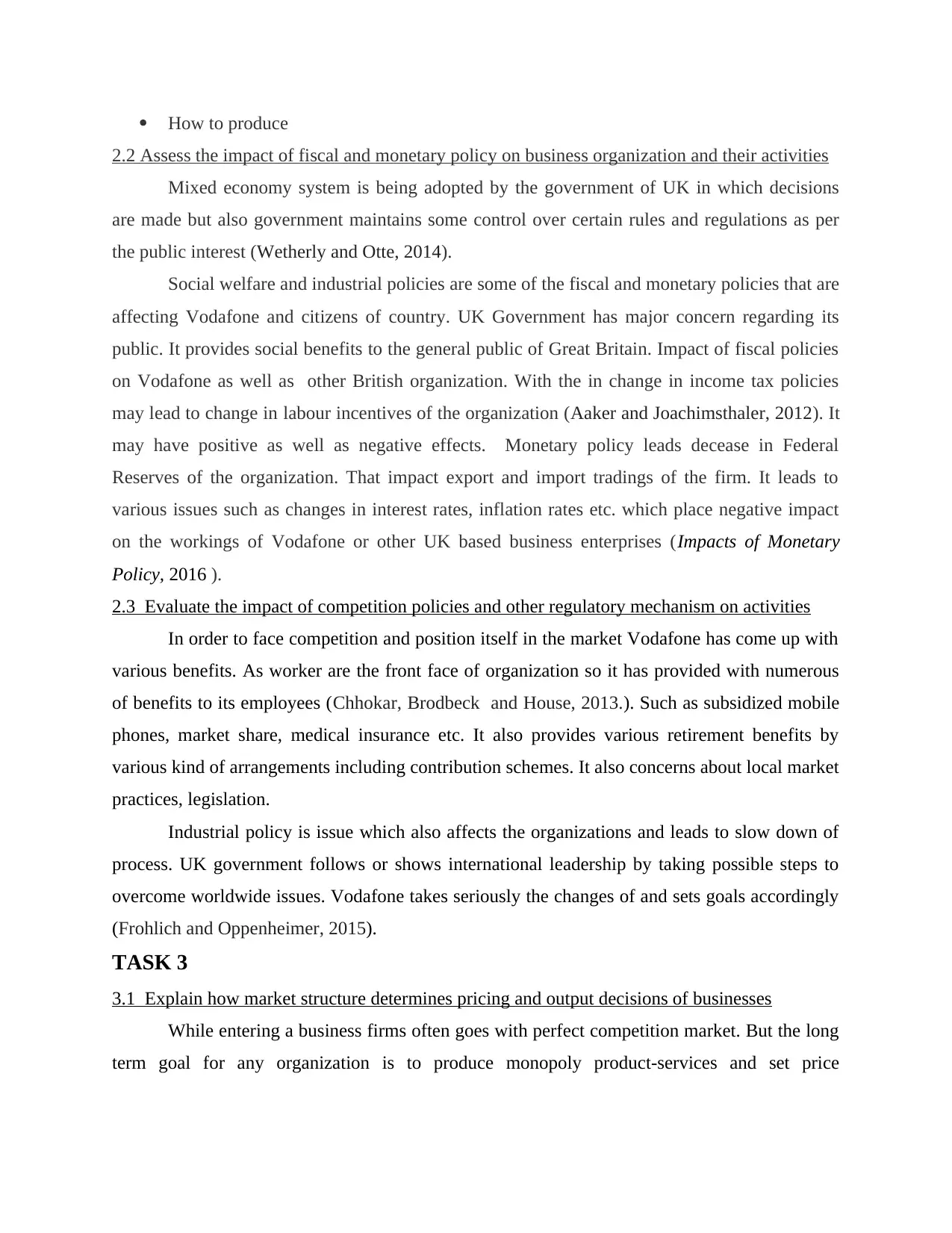
How to produce
2.2 Assess the impact of fiscal and monetary policy on business organization and their activities
Mixed economy system is being adopted by the government of UK in which decisions
are made but also government maintains some control over certain rules and regulations as per
the public interest (Wetherly and Otte, 2014).
Social welfare and industrial policies are some of the fiscal and monetary policies that are
affecting Vodafone and citizens of country. UK Government has major concern regarding its
public. It provides social benefits to the general public of Great Britain. Impact of fiscal policies
on Vodafone as well as other British organization. With the in change in income tax policies
may lead to change in labour incentives of the organization (Aaker and Joachimsthaler, 2012). It
may have positive as well as negative effects. Monetary policy leads decease in Federal
Reserves of the organization. That impact export and import tradings of the firm. It leads to
various issues such as changes in interest rates, inflation rates etc. which place negative impact
on the workings of Vodafone or other UK based business enterprises (Impacts of Monetary
Policy, 2016 ).
2.3 Evaluate the impact of competition policies and other regulatory mechanism on activities
In order to face competition and position itself in the market Vodafone has come up with
various benefits. As worker are the front face of organization so it has provided with numerous
of benefits to its employees (Chhokar, Brodbeck and House, 2013.). Such as subsidized mobile
phones, market share, medical insurance etc. It also provides various retirement benefits by
various kind of arrangements including contribution schemes. It also concerns about local market
practices, legislation.
Industrial policy is issue which also affects the organizations and leads to slow down of
process. UK government follows or shows international leadership by taking possible steps to
overcome worldwide issues. Vodafone takes seriously the changes of and sets goals accordingly
(Frohlich and Oppenheimer, 2015).
TASK 3
3.1 Explain how market structure determines pricing and output decisions of businesses
While entering a business firms often goes with perfect competition market. But the long
term goal for any organization is to produce monopoly product-services and set price
2.2 Assess the impact of fiscal and monetary policy on business organization and their activities
Mixed economy system is being adopted by the government of UK in which decisions
are made but also government maintains some control over certain rules and regulations as per
the public interest (Wetherly and Otte, 2014).
Social welfare and industrial policies are some of the fiscal and monetary policies that are
affecting Vodafone and citizens of country. UK Government has major concern regarding its
public. It provides social benefits to the general public of Great Britain. Impact of fiscal policies
on Vodafone as well as other British organization. With the in change in income tax policies
may lead to change in labour incentives of the organization (Aaker and Joachimsthaler, 2012). It
may have positive as well as negative effects. Monetary policy leads decease in Federal
Reserves of the organization. That impact export and import tradings of the firm. It leads to
various issues such as changes in interest rates, inflation rates etc. which place negative impact
on the workings of Vodafone or other UK based business enterprises (Impacts of Monetary
Policy, 2016 ).
2.3 Evaluate the impact of competition policies and other regulatory mechanism on activities
In order to face competition and position itself in the market Vodafone has come up with
various benefits. As worker are the front face of organization so it has provided with numerous
of benefits to its employees (Chhokar, Brodbeck and House, 2013.). Such as subsidized mobile
phones, market share, medical insurance etc. It also provides various retirement benefits by
various kind of arrangements including contribution schemes. It also concerns about local market
practices, legislation.
Industrial policy is issue which also affects the organizations and leads to slow down of
process. UK government follows or shows international leadership by taking possible steps to
overcome worldwide issues. Vodafone takes seriously the changes of and sets goals accordingly
(Frohlich and Oppenheimer, 2015).
TASK 3
3.1 Explain how market structure determines pricing and output decisions of businesses
While entering a business firms often goes with perfect competition market. But the long
term goal for any organization is to produce monopoly product-services and set price
⊘ This is a preview!⊘
Do you want full access?
Subscribe today to unlock all pages.

Trusted by 1+ million students worldwide
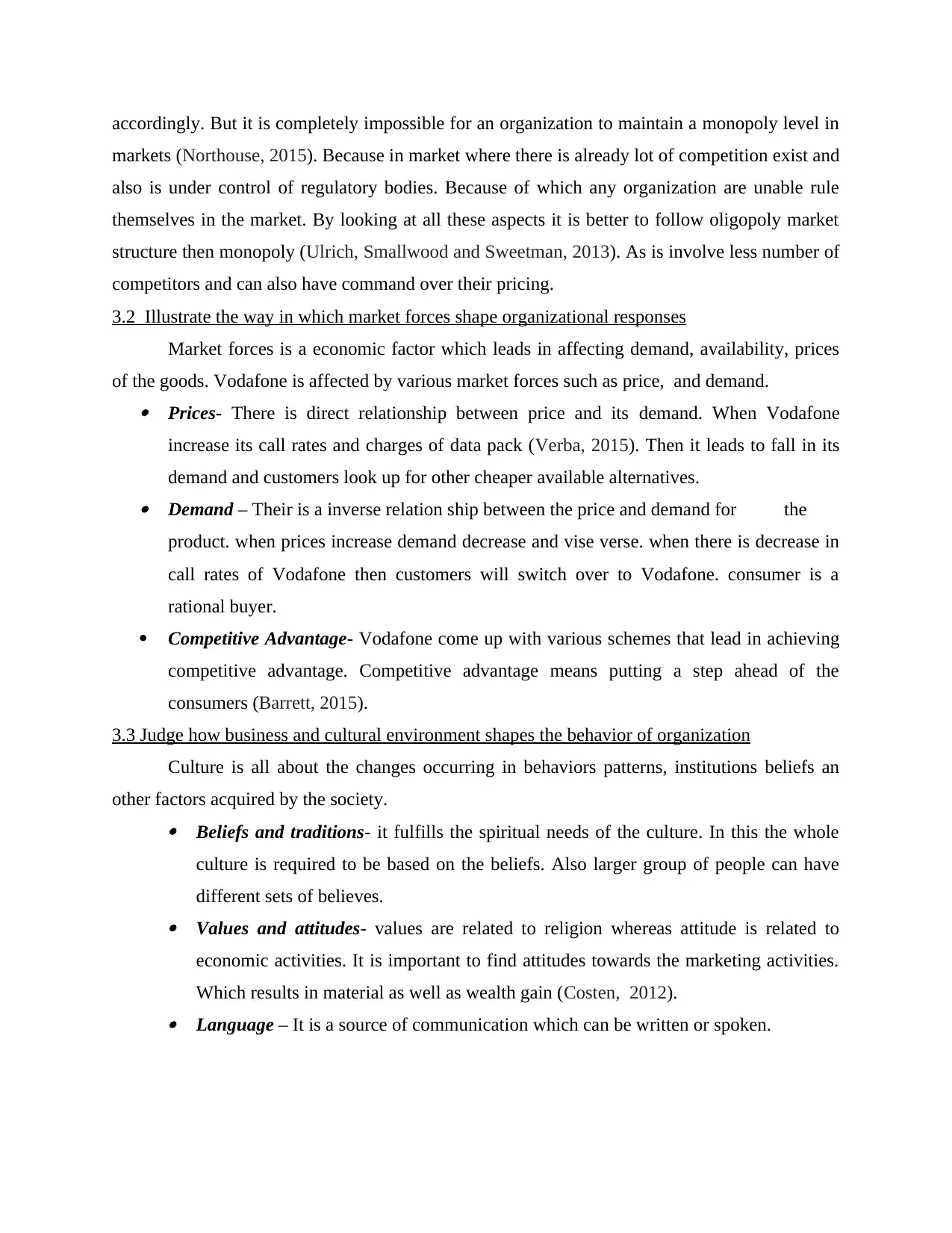
accordingly. But it is completely impossible for an organization to maintain a monopoly level in
markets (Northouse, 2015). Because in market where there is already lot of competition exist and
also is under control of regulatory bodies. Because of which any organization are unable rule
themselves in the market. By looking at all these aspects it is better to follow oligopoly market
structure then monopoly (Ulrich, Smallwood and Sweetman, 2013). As is involve less number of
competitors and can also have command over their pricing.
3.2 Illustrate the way in which market forces shape organizational responses
Market forces is a economic factor which leads in affecting demand, availability, prices
of the goods. Vodafone is affected by various market forces such as price, and demand. Prices- There is direct relationship between price and its demand. When Vodafone
increase its call rates and charges of data pack (Verba, 2015). Then it leads to fall in its
demand and customers look up for other cheaper available alternatives. Demand – Their is a inverse relation ship between the price and demand for the
product. when prices increase demand decrease and vise verse. when there is decrease in
call rates of Vodafone then customers will switch over to Vodafone. consumer is a
rational buyer.
Competitive Advantage- Vodafone come up with various schemes that lead in achieving
competitive advantage. Competitive advantage means putting a step ahead of the
consumers (Barrett, 2015).
3.3 Judge how business and cultural environment shapes the behavior of organization
Culture is all about the changes occurring in behaviors patterns, institutions beliefs an
other factors acquired by the society.
Beliefs and traditions- it fulfills the spiritual needs of the culture. In this the whole
culture is required to be based on the beliefs. Also larger group of people can have
different sets of believes.
Values and attitudes- values are related to religion whereas attitude is related to
economic activities. It is important to find attitudes towards the marketing activities.
Which results in material as well as wealth gain (Costen, 2012).
Language – It is a source of communication which can be written or spoken.
markets (Northouse, 2015). Because in market where there is already lot of competition exist and
also is under control of regulatory bodies. Because of which any organization are unable rule
themselves in the market. By looking at all these aspects it is better to follow oligopoly market
structure then monopoly (Ulrich, Smallwood and Sweetman, 2013). As is involve less number of
competitors and can also have command over their pricing.
3.2 Illustrate the way in which market forces shape organizational responses
Market forces is a economic factor which leads in affecting demand, availability, prices
of the goods. Vodafone is affected by various market forces such as price, and demand. Prices- There is direct relationship between price and its demand. When Vodafone
increase its call rates and charges of data pack (Verba, 2015). Then it leads to fall in its
demand and customers look up for other cheaper available alternatives. Demand – Their is a inverse relation ship between the price and demand for the
product. when prices increase demand decrease and vise verse. when there is decrease in
call rates of Vodafone then customers will switch over to Vodafone. consumer is a
rational buyer.
Competitive Advantage- Vodafone come up with various schemes that lead in achieving
competitive advantage. Competitive advantage means putting a step ahead of the
consumers (Barrett, 2015).
3.3 Judge how business and cultural environment shapes the behavior of organization
Culture is all about the changes occurring in behaviors patterns, institutions beliefs an
other factors acquired by the society.
Beliefs and traditions- it fulfills the spiritual needs of the culture. In this the whole
culture is required to be based on the beliefs. Also larger group of people can have
different sets of believes.
Values and attitudes- values are related to religion whereas attitude is related to
economic activities. It is important to find attitudes towards the marketing activities.
Which results in material as well as wealth gain (Costen, 2012).
Language – It is a source of communication which can be written or spoken.
Paraphrase This Document
Need a fresh take? Get an instant paraphrase of this document with our AI Paraphraser

Norms – it is a specifics guidelines that is based on valuers. It specifies rule and
regulations that are expected under different situations (Estampe, Lamouri, Paris and
Brahim-Djelloul, 2013).
Impact of business and cultural environments on the organization. Beliefs and traditions – Every country has its own traditions and rituals that are to be
followed or kept in mind by the business organization such as Vodafone. Advertisements
of organization plays a vital role in these factors (Hwang and et.al., 2013). As it is a
world wide organization and focuses on various sectors of market. So it has to make sure
that it does not break any belief or rituals through its advertisements. Whereas sometimes
it may also lead to profit of organization.
Languages- It is a way through which an organization communicates directly with its
customers. It approaches its consumers by the way of languages. So it should kept in kind
while releasing and of the add. As it is a global company so it has to make sure about
language use (Kundu, Rattan, Sheera and Gahlawat, 2015). It cannot attract people living
in UK y Hindi advertisement and vise versa.
TASK 4
4.1 Discuss the significance of international trade to Vodafone
International trade and economic integration allows entry of organizations to global level.
It is a service sector economy based on open economy. Britishers economy encourages world
wide trading. Along with fulfillment of basic needs it also emphasis on providing job
opportunities at global level. Importance of international trade to Vodafone as well as other
organizations of UK are. International trade has lead to increase in inflows as well as outflows of
the organizations in UK (Özer and Tınaztepe, 2014). As new entrant brings capital and job
opportunities with it which further helps in building British economy. It lead to rise in the level
of penetration of previous comparative advantages that has been occurred from various clothes
and textile manufacturers. It also helps in development of competitive advantages. AS there is no
monopolistic market in UK which carries a lot of competition in each sector. This leads to make
choices for the people of the organization. Also in case of telecommunication services Vodafone
has various competitors which gives consumers various choices. International trade has also lead
to in structural changes of the organization that are based in UK (Shackleton, 2015).
regulations that are expected under different situations (Estampe, Lamouri, Paris and
Brahim-Djelloul, 2013).
Impact of business and cultural environments on the organization. Beliefs and traditions – Every country has its own traditions and rituals that are to be
followed or kept in mind by the business organization such as Vodafone. Advertisements
of organization plays a vital role in these factors (Hwang and et.al., 2013). As it is a
world wide organization and focuses on various sectors of market. So it has to make sure
that it does not break any belief or rituals through its advertisements. Whereas sometimes
it may also lead to profit of organization.
Languages- It is a way through which an organization communicates directly with its
customers. It approaches its consumers by the way of languages. So it should kept in kind
while releasing and of the add. As it is a global company so it has to make sure about
language use (Kundu, Rattan, Sheera and Gahlawat, 2015). It cannot attract people living
in UK y Hindi advertisement and vise versa.
TASK 4
4.1 Discuss the significance of international trade to Vodafone
International trade and economic integration allows entry of organizations to global level.
It is a service sector economy based on open economy. Britishers economy encourages world
wide trading. Along with fulfillment of basic needs it also emphasis on providing job
opportunities at global level. Importance of international trade to Vodafone as well as other
organizations of UK are. International trade has lead to increase in inflows as well as outflows of
the organizations in UK (Özer and Tınaztepe, 2014). As new entrant brings capital and job
opportunities with it which further helps in building British economy. It lead to rise in the level
of penetration of previous comparative advantages that has been occurred from various clothes
and textile manufacturers. It also helps in development of competitive advantages. AS there is no
monopolistic market in UK which carries a lot of competition in each sector. This leads to make
choices for the people of the organization. Also in case of telecommunication services Vodafone
has various competitors which gives consumers various choices. International trade has also lead
to in structural changes of the organization that are based in UK (Shackleton, 2015).

4.2 Global factors that impact Vodafone work culture
Globalisation is considered as worldwide movement that allows business firm to focus on
number of factors that plays key role in success of organisation. It provides better opportunity to
accomplish goals in desired form. Economy, political and technological are three key factors that
may influence the work culture of Vodafone. In addition to economic aspect, the company needs
to consider changes in economic system effectively for further developments. Any of changes in
GDP, tax rates and foreign exchange rates may affect business. For example, the increase foreign
exchange rates will force business to invest less in international market so that better profit can
be accomplished. Political aspects also plays key role in organisational success while operating
business in international market (Taylor, 2014 ). For example, the UK government does not have
good relationship with Korea. It means the company can face conflict situations while expanding
business in Korea. Technological changes also forces organisation to bring transformation in
technology as per needs of international market. Such as adaptation of 4G technology to meet
standards.
4.3 Impact of EU policies
EU is referred as European Union that provides fair trade opportunities to business firms
in international market. There are number of policies that need to be followed by Vodafone for
better opportunities in marketplace. Antitrust policy is act that ensure that business is not
involved in unethical practice (West and Lyubovnikova, 2013). If organisation avoids antitrust
policy then business may face legal issues and its license may be cancelled to operate business in
Europe. Effective consideration provides an ability create ethical brand image in the market and
gain competitive advantage. Data protection policy is act that protects confidential information
and provides better opportunities to business. Any kind of avoidance in this respect may create
legal issues for company. Proper consideration is advantageous for creating better trust among
customers (Craig and Campbell, 2012).
CONCLUSIONS
This report was based on business environment of Vodafone organization. It is a UK
based firm operates in telecommunication services. Identified in those report about the purposes
of different type of organization more specifically of Vodafone. Also described the extent to
which Vodafone, a telecom company meets the needs and objectives of its stakeholders. Further
Globalisation is considered as worldwide movement that allows business firm to focus on
number of factors that plays key role in success of organisation. It provides better opportunity to
accomplish goals in desired form. Economy, political and technological are three key factors that
may influence the work culture of Vodafone. In addition to economic aspect, the company needs
to consider changes in economic system effectively for further developments. Any of changes in
GDP, tax rates and foreign exchange rates may affect business. For example, the increase foreign
exchange rates will force business to invest less in international market so that better profit can
be accomplished. Political aspects also plays key role in organisational success while operating
business in international market (Taylor, 2014 ). For example, the UK government does not have
good relationship with Korea. It means the company can face conflict situations while expanding
business in Korea. Technological changes also forces organisation to bring transformation in
technology as per needs of international market. Such as adaptation of 4G technology to meet
standards.
4.3 Impact of EU policies
EU is referred as European Union that provides fair trade opportunities to business firms
in international market. There are number of policies that need to be followed by Vodafone for
better opportunities in marketplace. Antitrust policy is act that ensure that business is not
involved in unethical practice (West and Lyubovnikova, 2013). If organisation avoids antitrust
policy then business may face legal issues and its license may be cancelled to operate business in
Europe. Effective consideration provides an ability create ethical brand image in the market and
gain competitive advantage. Data protection policy is act that protects confidential information
and provides better opportunities to business. Any kind of avoidance in this respect may create
legal issues for company. Proper consideration is advantageous for creating better trust among
customers (Craig and Campbell, 2012).
CONCLUSIONS
This report was based on business environment of Vodafone organization. It is a UK
based firm operates in telecommunication services. Identified in those report about the purposes
of different type of organization more specifically of Vodafone. Also described the extent to
which Vodafone, a telecom company meets the needs and objectives of its stakeholders. Further
⊘ This is a preview!⊘
Do you want full access?
Subscribe today to unlock all pages.

Trusted by 1+ million students worldwide
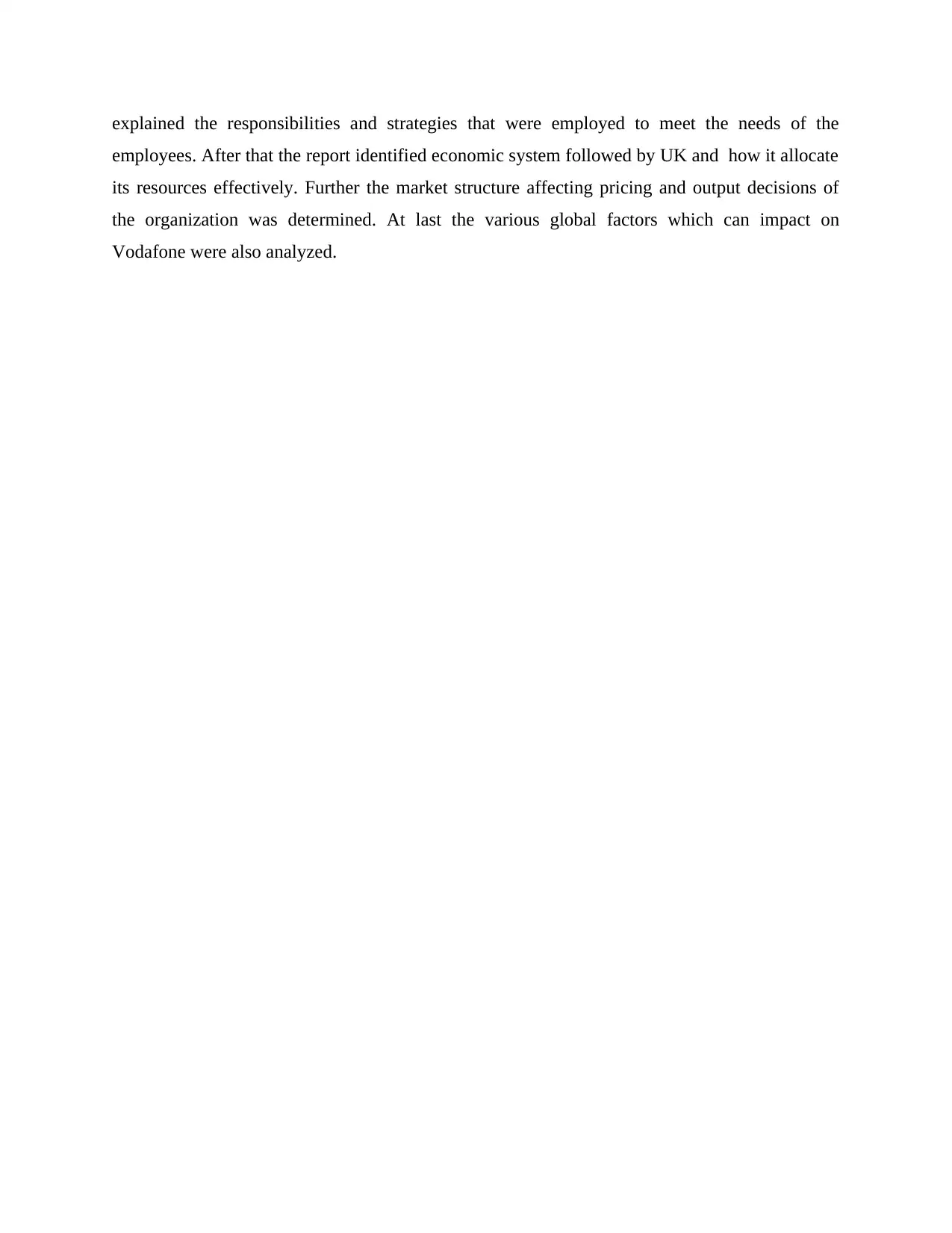
explained the responsibilities and strategies that were employed to meet the needs of the
employees. After that the report identified economic system followed by UK and how it allocate
its resources effectively. Further the market structure affecting pricing and output decisions of
the organization was determined. At last the various global factors which can impact on
Vodafone were also analyzed.
employees. After that the report identified economic system followed by UK and how it allocate
its resources effectively. Further the market structure affecting pricing and output decisions of
the organization was determined. At last the various global factors which can impact on
Vodafone were also analyzed.
Paraphrase This Document
Need a fresh take? Get an instant paraphrase of this document with our AI Paraphraser
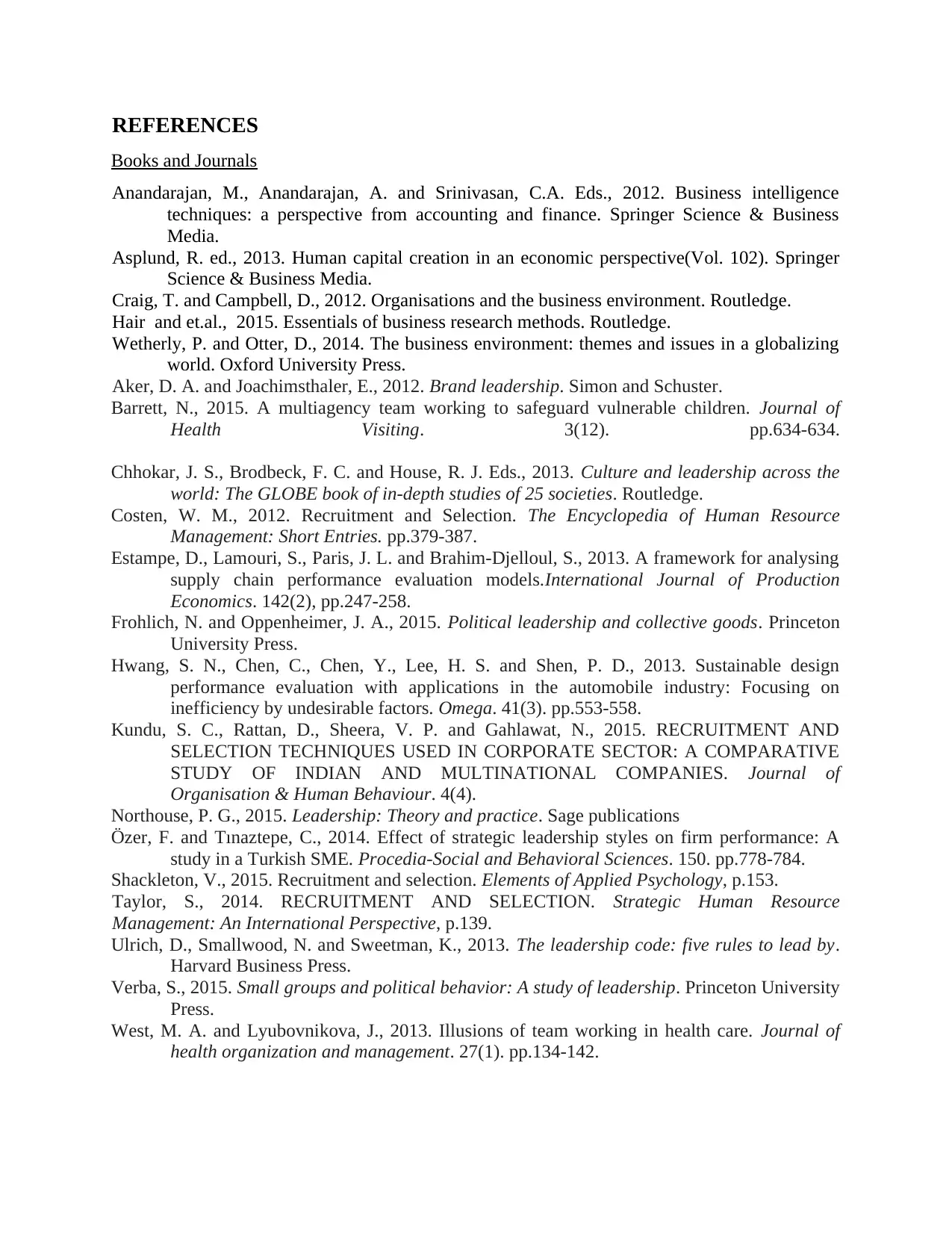
REFERENCES
Books and Journals
Anandarajan, M., Anandarajan, A. and Srinivasan, C.A. Eds., 2012. Business intelligence
techniques: a perspective from accounting and finance. Springer Science & Business
Media.
Asplund, R. ed., 2013. Human capital creation in an economic perspective(Vol. 102). Springer
Science & Business Media.
Craig, T. and Campbell, D., 2012. Organisations and the business environment. Routledge.
Hair and et.al., 2015. Essentials of business research methods. Routledge.
Wetherly, P. and Otter, D., 2014. The business environment: themes and issues in a globalizing
world. Oxford University Press.
Aker, D. A. and Joachimsthaler, E., 2012. Brand leadership. Simon and Schuster.
Barrett, N., 2015. A multiagency team working to safeguard vulnerable children. Journal of
Health Visiting. 3(12). pp.634-634.
Chhokar, J. S., Brodbeck, F. C. and House, R. J. Eds., 2013. Culture and leadership across the
world: The GLOBE book of in-depth studies of 25 societies. Routledge.
Costen, W. M., 2012. Recruitment and Selection. The Encyclopedia of Human Resource
Management: Short Entries. pp.379-387.
Estampe, D., Lamouri, S., Paris, J. L. and Brahim-Djelloul, S., 2013. A framework for analysing
supply chain performance evaluation models.International Journal of Production
Economics. 142(2), pp.247-258.
Frohlich, N. and Oppenheimer, J. A., 2015. Political leadership and collective goods. Princeton
University Press.
Hwang, S. N., Chen, C., Chen, Y., Lee, H. S. and Shen, P. D., 2013. Sustainable design
performance evaluation with applications in the automobile industry: Focusing on
inefficiency by undesirable factors. Omega. 41(3). pp.553-558.
Kundu, S. C., Rattan, D., Sheera, V. P. and Gahlawat, N., 2015. RECRUITMENT AND
SELECTION TECHNIQUES USED IN CORPORATE SECTOR: A COMPARATIVE
STUDY OF INDIAN AND MULTINATIONAL COMPANIES. Journal of
Organisation & Human Behaviour. 4(4).
Northouse, P. G., 2015. Leadership: Theory and practice. Sage publications
Özer, F. and Tınaztepe, C., 2014. Effect of strategic leadership styles on firm performance: A
study in a Turkish SME. Procedia-Social and Behavioral Sciences. 150. pp.778-784.
Shackleton, V., 2015. Recruitment and selection. Elements of Applied Psychology, p.153.
Taylor, S., 2014. RECRUITMENT AND SELECTION. Strategic Human Resource
Management: An International Perspective, p.139.
Ulrich, D., Smallwood, N. and Sweetman, K., 2013. The leadership code: five rules to lead by.
Harvard Business Press.
Verba, S., 2015. Small groups and political behavior: A study of leadership. Princeton University
Press.
West, M. A. and Lyubovnikova, J., 2013. Illusions of team working in health care. Journal of
health organization and management. 27(1). pp.134-142.
Books and Journals
Anandarajan, M., Anandarajan, A. and Srinivasan, C.A. Eds., 2012. Business intelligence
techniques: a perspective from accounting and finance. Springer Science & Business
Media.
Asplund, R. ed., 2013. Human capital creation in an economic perspective(Vol. 102). Springer
Science & Business Media.
Craig, T. and Campbell, D., 2012. Organisations and the business environment. Routledge.
Hair and et.al., 2015. Essentials of business research methods. Routledge.
Wetherly, P. and Otter, D., 2014. The business environment: themes and issues in a globalizing
world. Oxford University Press.
Aker, D. A. and Joachimsthaler, E., 2012. Brand leadership. Simon and Schuster.
Barrett, N., 2015. A multiagency team working to safeguard vulnerable children. Journal of
Health Visiting. 3(12). pp.634-634.
Chhokar, J. S., Brodbeck, F. C. and House, R. J. Eds., 2013. Culture and leadership across the
world: The GLOBE book of in-depth studies of 25 societies. Routledge.
Costen, W. M., 2012. Recruitment and Selection. The Encyclopedia of Human Resource
Management: Short Entries. pp.379-387.
Estampe, D., Lamouri, S., Paris, J. L. and Brahim-Djelloul, S., 2013. A framework for analysing
supply chain performance evaluation models.International Journal of Production
Economics. 142(2), pp.247-258.
Frohlich, N. and Oppenheimer, J. A., 2015. Political leadership and collective goods. Princeton
University Press.
Hwang, S. N., Chen, C., Chen, Y., Lee, H. S. and Shen, P. D., 2013. Sustainable design
performance evaluation with applications in the automobile industry: Focusing on
inefficiency by undesirable factors. Omega. 41(3). pp.553-558.
Kundu, S. C., Rattan, D., Sheera, V. P. and Gahlawat, N., 2015. RECRUITMENT AND
SELECTION TECHNIQUES USED IN CORPORATE SECTOR: A COMPARATIVE
STUDY OF INDIAN AND MULTINATIONAL COMPANIES. Journal of
Organisation & Human Behaviour. 4(4).
Northouse, P. G., 2015. Leadership: Theory and practice. Sage publications
Özer, F. and Tınaztepe, C., 2014. Effect of strategic leadership styles on firm performance: A
study in a Turkish SME. Procedia-Social and Behavioral Sciences. 150. pp.778-784.
Shackleton, V., 2015. Recruitment and selection. Elements of Applied Psychology, p.153.
Taylor, S., 2014. RECRUITMENT AND SELECTION. Strategic Human Resource
Management: An International Perspective, p.139.
Ulrich, D., Smallwood, N. and Sweetman, K., 2013. The leadership code: five rules to lead by.
Harvard Business Press.
Verba, S., 2015. Small groups and political behavior: A study of leadership. Princeton University
Press.
West, M. A. and Lyubovnikova, J., 2013. Illusions of team working in health care. Journal of
health organization and management. 27(1). pp.134-142.
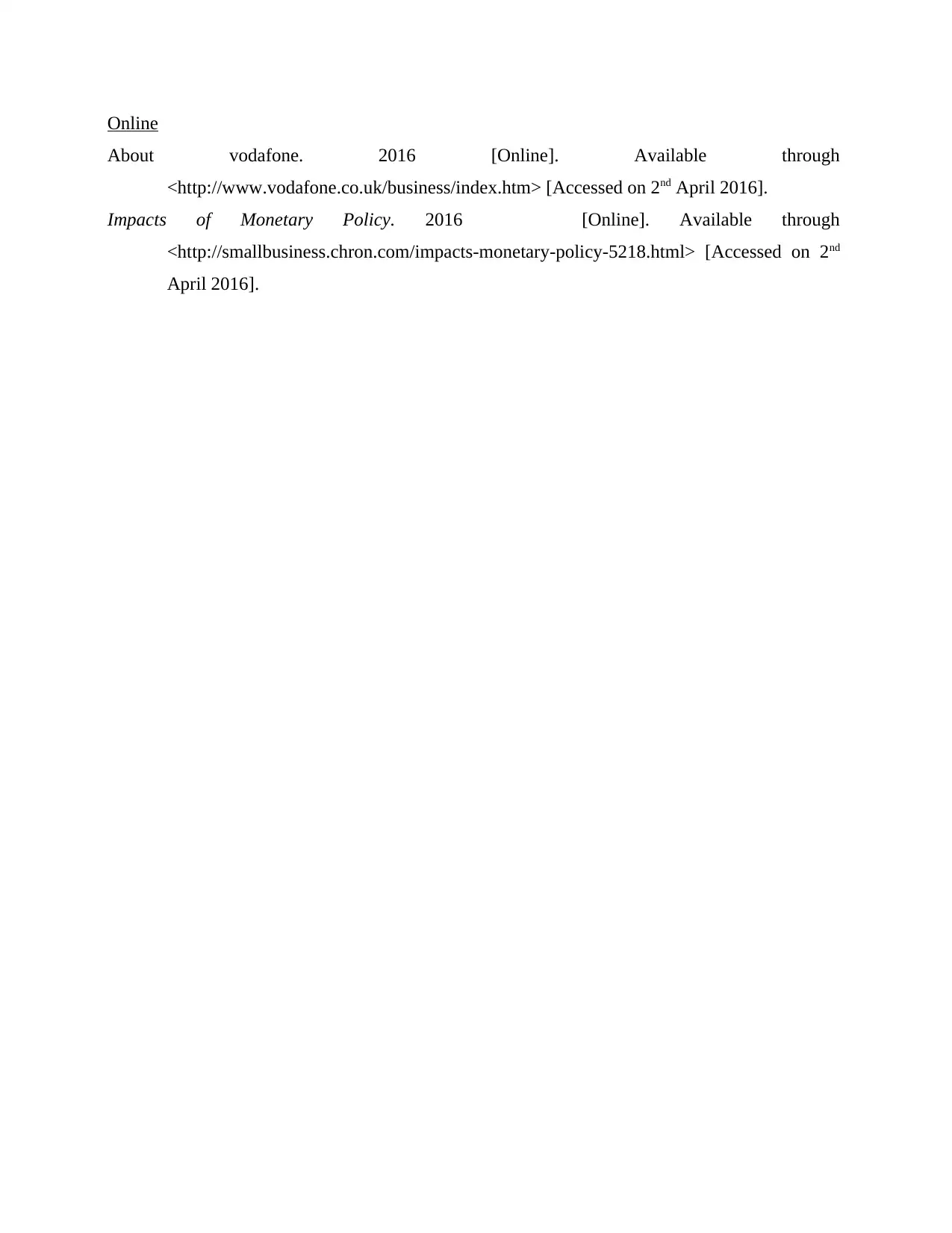
Online
About vodafone. 2016 [Online]. Available through
<http://www.vodafone.co.uk/business/index.htm> [Accessed on 2nd April 2016].
Impacts of Monetary Policy. 2016 [Online]. Available through
<http://smallbusiness.chron.com/impacts-monetary-policy-5218.html> [Accessed on 2nd
April 2016].
About vodafone. 2016 [Online]. Available through
<http://www.vodafone.co.uk/business/index.htm> [Accessed on 2nd April 2016].
Impacts of Monetary Policy. 2016 [Online]. Available through
<http://smallbusiness.chron.com/impacts-monetary-policy-5218.html> [Accessed on 2nd
April 2016].
⊘ This is a preview!⊘
Do you want full access?
Subscribe today to unlock all pages.

Trusted by 1+ million students worldwide
1 out of 12
Related Documents
Your All-in-One AI-Powered Toolkit for Academic Success.
+13062052269
info@desklib.com
Available 24*7 on WhatsApp / Email
![[object Object]](/_next/static/media/star-bottom.7253800d.svg)
Unlock your academic potential
Copyright © 2020–2026 A2Z Services. All Rights Reserved. Developed and managed by ZUCOL.





